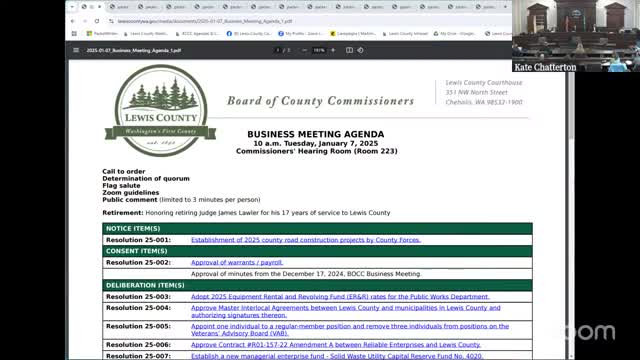Resident urges county study after state reissues biosolids permits
Get AI-powered insights, summaries, and transcripts
Subscribe
Summary
A longtime Packwood-area resident told the Lewis County Board of County Commissioners that newly reissued state permits allowing land application of biosolids risk groundwater and stream contamination, and offered to raise money for a local soil and groundwater study.
Bob Gunther, a Packwood-area resident, told the Lewis County Board of County Commissioners on Jan. 7 that he believes the state’s renewed permits for land application of biosolids are contaminating local streams and shallow groundwater.
Gunther said he has raised the issue at county meetings for about 20 years and that the Environmental Protection Agency and state Department of Ecology materials he provided to the commissioners identify “over 700 harmful chemicals” in biosolids from municipal waste plants. He said Lewis County previously joined litigation against the Department of Ecology and that a Pollution Control Hearings Board order led to testing requirements at application sites, but he said those rules are not being followed locally.
Gunther urged the county to investigate and offered to raise private funds for “a comprehensive study of what is in the ground” at lands that have received biosolids over the past two decades, saying tests the state now requires (including a minimum depth-to-groundwater restriction) are not always observed in the field. He identified application sites along State Route 508 and Napa Vine Forest Road as being on an aquifer recharge area that supplies the city of Chehalis.
The statement was delivered during the meeting’s public-comment period; commissioners did not take formal action during the meeting on Gunther’s request. Gunther referenced Senate Bill 6163 from the 2024 legislative session and material he said came from the EPA and Department of Ecology; he also described prior administrative and court filings he made against the Department of Ecology.
Because the remarks occurred during public comment, they represent citizen concerns and a volunteer offer to fund local testing rather than an official county directive. Gunther said he would help raise money to pay for sampling and testing but did not specify a timeline, sample locations, or a testing protocol at the meeting.
The matter involves multiple agencies named by the speaker (the U.S. Environmental Protection Agency and the Washington State Department of Ecology) and a state legislative action he identified by bill number; any formal county-led sampling, regulation, or enforcement would require future action by the Board of County Commissioners or county staff.
